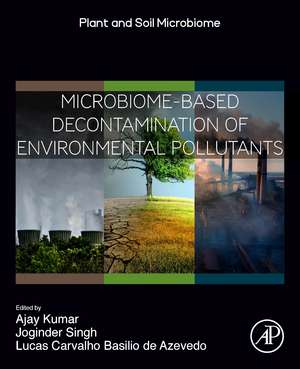Microbiome-Based Decontamination of Environmental Pollutants: Plant and Soil Microbiome
Editat de Ajay Kumar, Joginder Singh Panwar, Lucas Carvalho Basilio de Azevedoen Limba Engleză Paperback – 9 apr 2024
The physical and chemical changes caused by pollution of an ecosystem can occur rapidly, significantly impacting the functionality of ecosystem services in that environment. Environmental contamination poses and increasingly global challenge through direct and indirect adverse impacts on the climate, soil productivity and the health concerns of human beings. Traditional remediation techniques are not consistently feasible in mitigating environmental contaminants challenges in terms of cost-effectiveness, limited land resources and toxic residual products. The use of plant-associated microbes as part of a network of tools opens a new door to explore an alternative, eco-friendly and economical technology to mitigate the challenges of environmental contamination.
- Explores the emerging plant microbe interactive nexus for contaminants degradation
- Presents insights into the production and commercialization of plant-microbiome based enzymes
- Includes engineered microbes and microbial products application in contaminant management
- Highlights the latest omics and technologies used in plant–soil microbiome in contaminant management
Preț: 909.07 lei
Preț vechi: 1185.62 lei
-23% Nou
Puncte Express: 1364
Preț estimativ în valută:
173.96€ • 186.01$ • 145.04£
173.96€ • 186.01$ • 145.04£
Carte tipărită la comandă
Livrare economică 11-25 aprilie
Livrare express 13-19 martie pentru 114.03 lei
Preluare comenzi: 021 569.72.76
Specificații
ISBN-13: 9780443217814
ISBN-10: 0443217815
Pagini: 494
Dimensiuni: 191 x 235 x 27 mm
Greutate: 1.02 kg
Editura: ELSEVIER SCIENCE
Seria Plant and Soil Microbiome
ISBN-10: 0443217815
Pagini: 494
Dimensiuni: 191 x 235 x 27 mm
Greutate: 1.02 kg
Editura: ELSEVIER SCIENCE
Seria Plant and Soil Microbiome
Cuprins
1. Bioremediation: using indigenous microorganisms to clean up the environment
2. Significance, mechanisms and environmental implications of microbe mediated remediation
3. Microbiome immobilized sorbents: status and future aspects
4. Understanding and Designing the Strategies for the Microbe-Mediated Remediation of Environmental Contaminants Using Omics Approaches
5. Microbial Indicators for Monitoring Pollution and Bioremediation
6. Bioremediation of high molecular weight polycyclic aromatic hydrocarbons
7. Biochemical approach in microbial degradation organic contaminants
8. Microbial Bioremediation of Metal and radionuclides: Approaches and Advancement
9. Microbe assisted remediation of xenobiotics: A sustainable solution
10. Importance of microbial surfactants in heavy metal remediation
11. Role of Microbial biofilms in bioremediation: Current Perspectives
12. Applications of Microbial extracellular polysaccharides in Bioremediation
13. Exploring the potential of cyanobacteria in contamination management
14. Potential use of Endophytic microbe in environment contamination management
15. Environmental antibiotics and resistance genes as emerging contaminants: and their bioremediation
16. Synthetic Microbial Consortia: utilization in environment sustainability
17. Microbiological risk assessment of food OR genetically modified organisms
2. Significance, mechanisms and environmental implications of microbe mediated remediation
3. Microbiome immobilized sorbents: status and future aspects
4. Understanding and Designing the Strategies for the Microbe-Mediated Remediation of Environmental Contaminants Using Omics Approaches
5. Microbial Indicators for Monitoring Pollution and Bioremediation
6. Bioremediation of high molecular weight polycyclic aromatic hydrocarbons
7. Biochemical approach in microbial degradation organic contaminants
8. Microbial Bioremediation of Metal and radionuclides: Approaches and Advancement
9. Microbe assisted remediation of xenobiotics: A sustainable solution
10. Importance of microbial surfactants in heavy metal remediation
11. Role of Microbial biofilms in bioremediation: Current Perspectives
12. Applications of Microbial extracellular polysaccharides in Bioremediation
13. Exploring the potential of cyanobacteria in contamination management
14. Potential use of Endophytic microbe in environment contamination management
15. Environmental antibiotics and resistance genes as emerging contaminants: and their bioremediation
16. Synthetic Microbial Consortia: utilization in environment sustainability
17. Microbiological risk assessment of food OR genetically modified organisms



